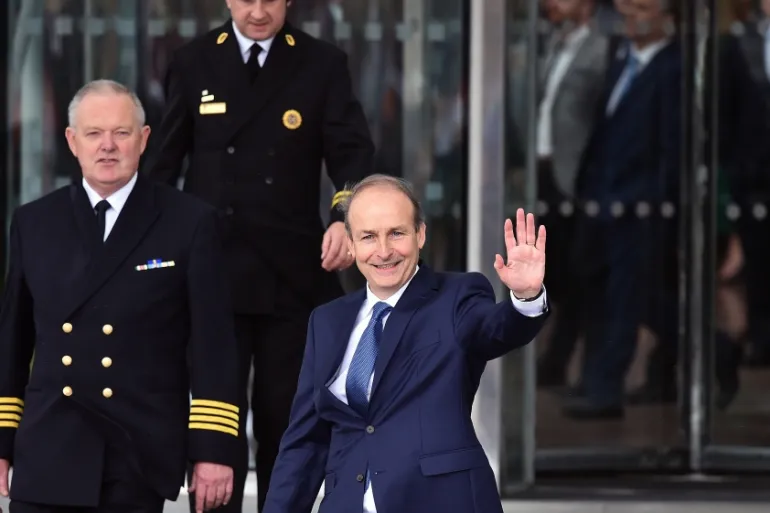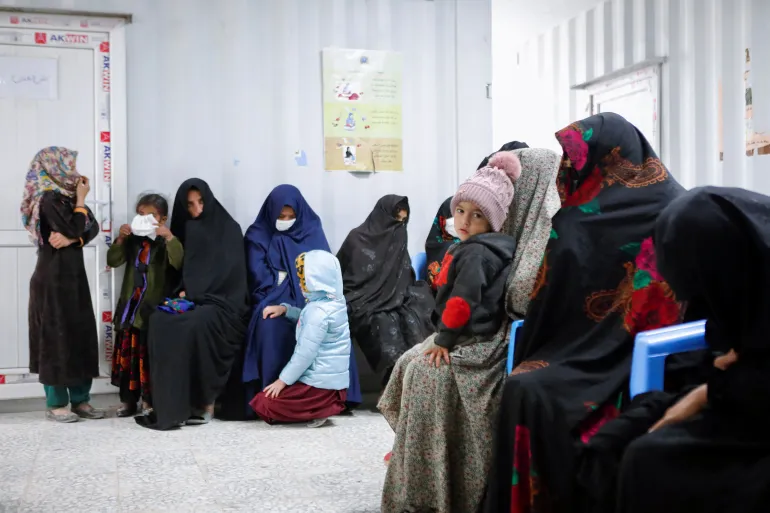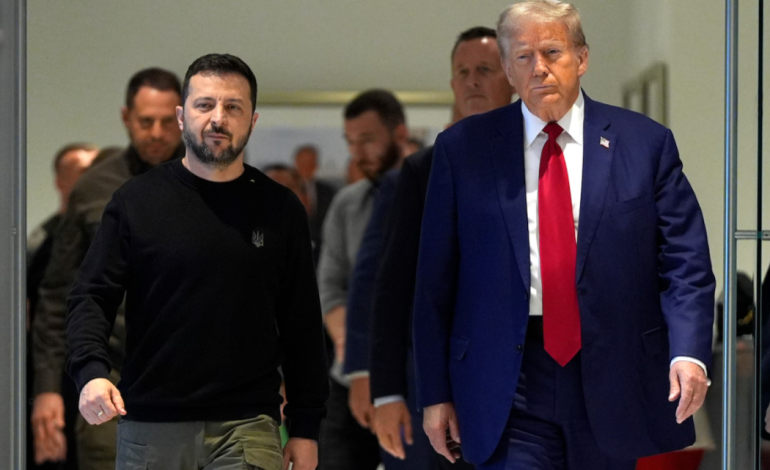As the Russia-Ukraine war approaches its third year, the geopolitical landscape is entering uncharted territory with Donald Trump securing a second term as President of the United States. Known for his unpredictable foreign policy and campaign rhetoric against endless wars, Trump’s return has raised questions about the future of US involvement in Ukraine.
To explore the potential shifts in US foreign policy, Wyoming Star spoke with Dr. Pablo Calderon Martinez, an associate professor in politics & international relations at Northeastern University London, an expert in geopolitics, and the Russia-Ukraine war.

Wyoming Star: As Donald Trump has now secured his second presidency, the world is looking at possible changes in US foreign policy. Donald Trump ran his campaign on an anti-war sentiment. However, recent statements by Senator Lindsey Graham suggest little change in the previous course. How do you foresee US foreign policy evolving? Could the US adopt a more assertive diplomatic stance toward Russia, or is a shift toward de-escalation and negotiation more likely?
Dr. Pablo Calderon Martinez: As with many other different things, I believe in terms of foreign policy the next administration is going to be, at the very least, unpredictable. It’s hard to tell whether Donald Trump is going to radically change course in terms of foreign policy, in particular in terms of support for Ukraine in its fight against Russia.
I do believe it is likely that he will push for some degree of de-escalation, and he may even put pressure on Ukraine to reach some sort of deal with Russia.
I believe the recent escalation in support from the US and its allies to Ukraine is a strategy that has two different but not necessarily contradicting objectives: on the one hand, this greater involvement in the conflict may make it harder for a Donald Trump administration to be able to get out of Ukraine with ease, and on the other hand the current Biden administration could be predicting a change in foreign policy by Donald Trump, and thus this is a move to improve Ukraine’s hand in possible incoming negotiations with Russia. However, I would reiterate that the main characteristic of the last Trump administration in terms of foreign policy was its unpredictability, and I would imagine more of the same will follow during his second administration.
Wyoming Star: Russia recently used its Intercontinental Ballistic Missile (ICBM) seemingly in response to the Biden administration allowing Ukraine to use ATACMS in Russia proper. What is the meaning of this move by the previous administration? Is it aimed to prevent Trump from pulling out of the conflict?
Dr. Pablo Calderon Martinez: As I was saying before, it’s hard to tell specifically what the objective is, but I think it could be a combination of two things: yes, on the one hand, it makes it harder for Trump to unilaterally and suddenly withdraw from the conflict, but it doesn’t necessarily make it impossible. We have seen how Donald Trump has been developing a sort of close relationship with Vladimir Putin and how Donald Trump praises himself for being the great negotiator. I could see a scenario in which Donald Trump pushes for an end to the conflict on whatever terms possible and places this for his political advantage. I think possibly the Biden administration knows this and understands this, which is why I think it is likelier that this is meant as a strategy to improve Ukraine’s position if and when negotiations to end the conflict begin.
Wyoming Star: Do you anticipate any changes in the scope or nature of US military aid to Ukraine, particularly in relation to advanced weapons systems like F-16s or long-range missiles?
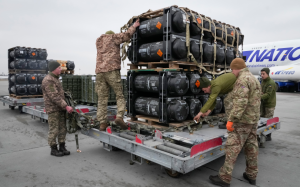
Dr. Pablo Calderon Martinez: Again, this will likely be determined by the broader foreign policy strategy the Trump administration decides to follow towards Ukraine, but I do think we can expect, if not necessarily a shifting policy, certainly a shift in tone. Trump’s deep campaign with strong rhetoric against the war has seen the Republican Party shift away from a position of unwavering support for Ukraine. As ever, Donald Trump is very clear that his main concerns are at home; his policies are primarily aimed at an American audience, and I think it would require a real shift in rhetoric from Donald Trump and the broader Republican Party to continue providing the same level of support the US has given Ukraine so far. But yet again, it is very hard to predict what any Donald Trump administration is going to do, particularly in the realm of foreign policy.
Like any other politician, there are two versions of Donald Trump: candidate Donald Trump and President Donald Trump.
Wyoming Star: How sustainable is the current level of US economic support to Ukraine, considering domestic political pressures and potential shifts in public opinion?
Dr. Pablo Calderon Martinez: As with military support, I believe this would necessarily be a political decision. In terms of actual costs, US taxpayers, what the United States is spending supporting Ukraine is not really a significant expenditure. Overall support from the United States is nearing $200 billion, which is, of course, a substantial amount of taxpayer money, but we also need to remember that a lot of this money remains in the US; most of the aid Ukraine is receiving is in the shape of military equipment and weaponry; most of these weapons come from pre-existing stockpiles that now have to be replenished. Most of this weaponry and equipment is made in the United States and is being de facto subsidized by the Ukraine Security Assistance Initiative. So, there will be some political pressure to maintain the current levels of expenditure and commitment to Ukraine; there is also not an overwhelming public opinion support for changing policies on Ukraine. Last I checked, most people in the US still view the support given to Ukraine favorably.
There is no major shift to stop supporting Ukraine across the US; there is, however, a growing shift in this direction among the Republican Party. It will all depend on other political calculations.
As with any other administration, Trump cannot keep all of his campaign promises and slogans; which ones he decides to compromise on will be a matter for him and his team to decide depending on the political calculations of the day.
Wyoming Star: Considering Trump’s position on NATO, do you foresee the US changing its relations with the alliance?
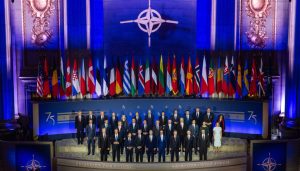
Dr. Pablo Calderon Martinez: The short answer is yes. We saw during the last Trump administration how disruptive Trump was towards the whole NATO alliance, and I would expect more of the same. To be fair, Trump did raise some important points about NATO in his past administration, and it is true that a lot of the NATO members were not fulfilling their commitments under the obligations of the treaty. Nevertheless, it is again hard to predict in which direction Trump is going to shape or change his policy towards NATO. I wouldn’t expect him to change his tone suddenly, so I expect he would still be critical of many NATO members and the organization, but I don’t think NATO is necessarily the main pantomime of the day.
Trump seems a lot more focused on criticizing the USA’s immediate neighbors for a perceived lack of support in securitizing the USA’s borders.
That has nothing to do with NATO. I would also expect most of the USA’s European partners know what to expect and can probably navigate any anti-NATO rhetoric Trump may come up with.
Wyoming Star: Could the US push for greater burden-sharing among NATO and EU allies to support Ukraine more effectively?
Dr. Pablo Calderon Martinez: Again, the answer is yes, and he wouldn’t necessarily be wrong for doing so.
Ukraine is largely a European problem, and Russia represents a more immediate threat to European states.
On the other hand, however, many European states (the UK and Germany in particular) are already very supportive of Ukraine and are happy to share some of the burden. But the same political calculations that Donald Trump is facing are troubling many political leaders across the continent. The steadfast public support for Ukraine is weakening in some parts of Europe, and the rise of a more pro-Russian (or at least less anti-Russian) far right across the continent will worry political leaders across the continent. This is a fine balancing act for many other countries outside the US. I do think, however, that many European countries and even many within the Trump incoming administration understand the strategic value of supporting Ukraine and deterring future Russian aggressions.
Wyoming Star: What are the prospects for Ukraine if the US stops or significantly weakens its support?
Dr. Pablo Calderon Martinez: Bleak. The only comparative advantage Ukraine has enjoyed during this conflict has been the extraordinary support it has received from the USA and Europe. I think most people (including Vladimir Putin himself!) would have predicted a swift Russian victory over Ukraine. The main variable that has tilted the balance of power in favor of Ukraine has been the extraordinary levels of support received from the West. Without this support, it would be hard to see any path for victory or even a stalemate with Russia.
Wyoming Star: How does the US view the role of China in the conflict, particularly its potential to mediate or supply Russia?
Dr. Pablo Calderon Martinez: A lot was made at the beginning of the conflict of the possible emergence of an anti-Western axis with Russia and China at its core. And whilst those fears are certainly not completely unfounded, the reality is, I believe, that China has more pressing concerns than what is going on in Ukraine.
I cannot see China as a potential mediator between the US and Russia, for example, and I also don’t see China supporting Russia beyond what is strategically necessary for China.
I am not sure how the US (more specifically the new Trump administration) may see this, but it feels to me Trump is far more concerned with China than he is with Russia.
Wyoming Star: What strategies might the US pursue to counter the growing alignment between Russia and other non-Western powers, such as Iran or North Korea? What are the dangers in Russia sharing nuclear and rocket technology with these countries?
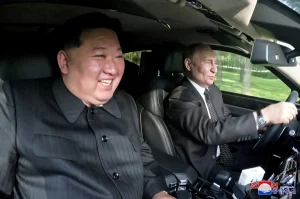
Dr. Pablo Calderon Martinez: To some extent, the danger is real, but I don’t think Russia is really in the business of sharing its nuclear secrets with other nations. I think Russia has to navigate carefully because closer collaboration with North Korea, as we’ve seen develop over the last few months, is not only problematic for the United States but may also be problematic for countries like China.
We sometimes tend to have a very reductionist view of the interactions between non-Western countries. It’s almost like we believe all non-Western states are united in a common strategy against the USA and its allies. The world is a very complex place, and states are not monolithic.
There is more to the relationship of Russia with countries like Iran and North Korea beyond their common dislike of the United States. Is there a danger of Russia, Iran, and North Korea developing closer links and presenting a common front against the West? Of course there is. But that risk is not greater today than it was a year ago, two years ago, or 10 years ago.
Wyoming Star: What conditions would need to be in place for the US to support a negotiated settlement, and how might this align with Ukrainian and European goals?
Dr. Pablo Calderon Martinez: I’m not sure about the conditions. In many ways I think the United States holds a lot of the power here, and the decision mostly relies on what the United States would want to do. If the United States under a Trump administration is serious about withdrawing support for Ukraine, the negotiated settlement is in my mind the only way forward. At this moment in time, I do not believe a negotiated settlement aligns with European goals, and it certainly would not seem to align at all with Ukrainian interests. Right now, it seems to me, Russia would almost invariably ask for either the outright annexation of territory or the establishment of some sort of quasi-independent territory in the east of Ukraine, which would be essentially Russian territory for all intents and purposes. I don’t think this will necessarily be in the interests of Europe, as it may embolden Putin, but only time will tell.
Wyoming Star: How realistic is the possibility of a frozen conflict, and what would be the implications for US foreign policy if the war becomes protracted without resolution?
Dr. Pablo Calderon Martinez: I think this is essentially already a frozen and protracted conflict. If all things remain the same, an outright victory for Russia seems unlikely, but it also seems unlikely to see Russia simply giving up and withdrawing its troops from Ukrainian territory. If the Donald Trump administration does not radically change foreign policy towards Ukraine, I see very little that could explain a sudden shift within the balance of the conflict.
Wyoming Star: What role is the US likely to play in the post-conflict reconstruction of Ukraine, both economically and politically?
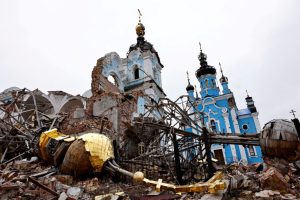
Dr. Pablo Calderon Martinez: Again, this is very hard to tell.
I think both in economic and political terms, any possible Ukrainian reconstruction or rehabilitation of sorts would pretty much depend on the US European partners.
To be fair, though, the European Union has a long track record of supporting, aiding, and integrating countries that have recently been through considerable political upheaval. This does not mean, of course, that Ukraine will immediately become a member of the European Union, as such a move could be seen (at least by Russia) as further “provocation.” If we are already talking about post-conflict resolution in Ukraine, I believe we’re assuming that there has been some sort of negotiated settlement between Russia and Ukraine. I believe any such settlement would include some degree of assurance that Ukraine would not be a member of NATO and, by extension, not a full EU member. What role the United States decides to play in any post-conflict reconstruction of Ukraine is very much unknown.
Wyoming Star: How might US-Russia relations evolve in the long term if the conflict reaches a stalemate or negotiated conclusion?
Dr. Pablo Calderon Martinez: It is certainly hard to see a way back. I think we need to consider this conflict as part of a broader shift towards the post-hegemonic international system, where I would expect to see many more challenges to the “authority” of the US. Again, what can happen in the long term is unknown, but unless something radical changes in Russia or the USA (which could very well happen), it is hard to see how the two countries will come back from here. I would certainly not expect Russia to try to “rehabilitate” its image as it did earlier this century, but a lot will depend on the view taken by future US administrations.
Wyoming Star: Could the war in Ukraine prompt the US to reevaluate its global military posture, particularly in regions like the Indo-Pacific?
Dr. Pablo Calderon Martinez: I doubt it. Ukraine has relatively little strategic geopolitical importance for the USA. The Pacific region is far more important from a geostrategic perspective, and I don’t see how the US can afford to change its posture.
If anything, I think a Donald Trump administration will become increasingly bullish in the Indo-Pacific.
Again, it is very hard to predict what Donald Trump may or may not do in terms of foreign policy, but he certainly seems to be a lot more preoccupied with China than he is with Russia.
Wyoming Star: What lessons is the US likely to draw from the conflict in terms of military strategy, cybersecurity, and hybrid warfare?
Dr. Pablo Calderon Martinez: Too early to tell if any lessons will be learned, let alone which ones! Militarily, I am not sure we learned anything we didn’t know before, at least not in terms of major strategy, mainly that in military conflict, resources are key; better weaponry and military hardware win you wars. Cybersecurity is a much more interesting question, but, if you ask me, despite this being very much a 21st-century issue, it was very much fought in the mold of the 20th century. In many ways this was an almost outdated type of military conflict between two states vying for (primarily) territory. A throwback to a different era rather than a projection of things to come.

